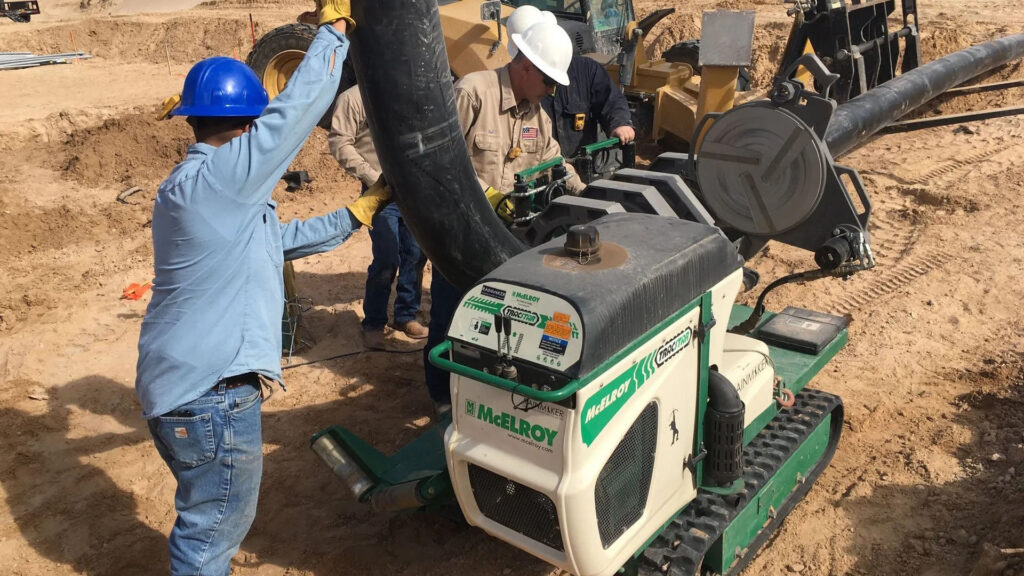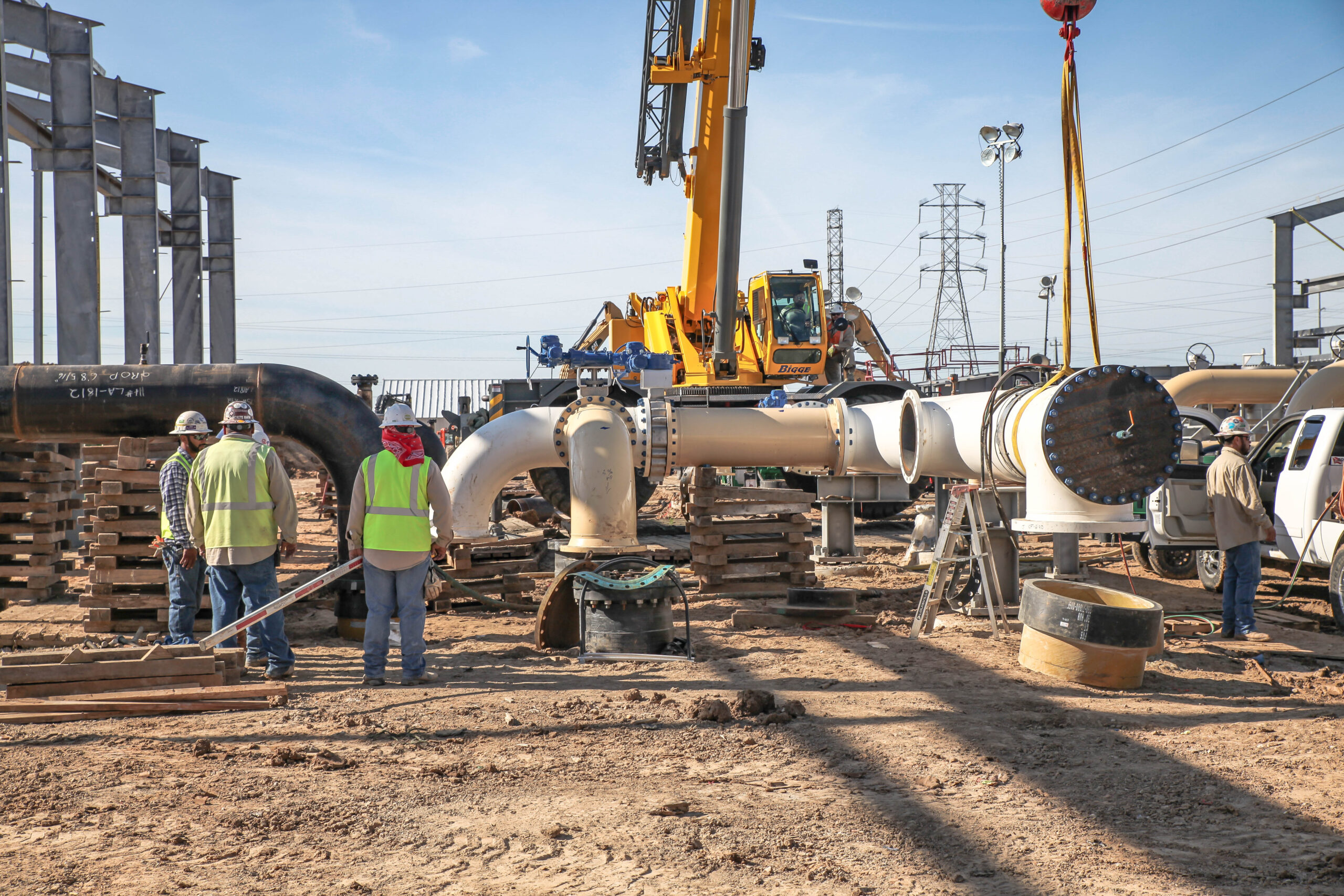Top Mistakes to Avoid When Selecting Pipeline Construction Services
Wiki Article
The Essential Guide to Comprehending Pipeline Construction Solutions and Their Significance
Pipeline Construction solutions are fundamental to the transport of vital sources such as water, oil, and gas. These solutions involve thorough planning and execution, adhering to rigid safety and security and ecological requirements. As the sector adapts to modern-day challenges, comprehending its components and effects ends up being increasingly important. What elements add to the expanding importance of these services in today's economic climate? The following sections will explore these critical aspects.Summary of Pipeline Construction Services
Pipeline Construction solutions incorporate an array of tasks crucial for the installment and maintenance of pipelines used to carry numerous compounds, consisting of oil, gas, and water. These solutions are important for guaranteeing the safe and reliable motion of sources from one area to one more. The process normally begins with comprehensive preparation and layout, which takes into consideration regulatory needs, environmental considerations, and logistical obstacles.Excavation and grading of the land are conducted to prepare the website for Pipeline installation as soon as planning is complete. This is complied with by the actual laying of the pipelines, which entails welding or joining areas with each other to produce a constant circulation course. After installation, strenuous testing is executed to ensure honesty and safety and security. Upkeep services are likewise provided to resolve any kind of problems that might develop gradually. In general, Pipeline Construction solutions play a critical duty in supporting framework for energy and water distribution.
Secret Components of Pipeline Construction
An effective Pipeline Construction project relies upon several vital components that guarantee the safe and effective installation of the Pipeline system. Extensive website assessments are critical, as they recognize the environmental and geographical factors that may influence Construction. Next, the option of proper products, such as pipelines and fittings, is essential for safeguarding toughness and compatibility with the delivered materials.In addition, progressed Construction strategies, consisting of trenchless modern technology and directional drilling, improve efficiency and minimize ecological effect. Efficient project management is one more critical component, collaborating labor, devices, and timelines to meet job objectives.
Furthermore, communication among stakeholders, including designers, professionals, and neighborhood authorities, warranties placement on job requirements and demands. Complete quality control actions throughout the Construction procedure make certain compliance with market requirements and optimize the Pipeline's functional lifespan. Jointly, these parts form the backbone of a successful Pipeline Construction job.
Safety Requirements and Rules in Pipeline Construction

Regulatory bodies, such as the Occupational Security and Wellness Management (OSHA) and the Pipeline and Hazardous Products Safety Management (PHMSA), stated particular needs that control Construction practices. These consist of protocols for equipment usage, employee training, and emergency response treatments. By implementing these criteria, Construction companies not only shield their staff members but also safe public count on. Inevitably, rigorous precaution contribute to the lasting success of Pipeline tasks, guaranteeing they satisfy both operational and environmental assumptions.
Environmental Considerations in Pipeline Projects

Environmental factors to consider are important to the preparation and execution of Pipeline projects. These projects should examine prospective influence on ecosystems, water resources, and neighborhood wild animals. Conducting thorough environmental influence evaluations (EIAs) is essential, allowing stakeholders to determine and mitigate dangers before Construction begins.
Protecting sensitive areas, such as habitats and marshes, often needs applying specific design functions or different transmitting to reduce interruption. Additionally, Pipeline drivers are entrusted with developing techniques for protecting against leakages and spills, which can have terrible impacts on the atmosphere.
Interaction with neighborhood neighborhoods is crucial, as public problems can bring about job alterations that enhance environmental security. Compliance with guidelines set by environmental companies ensures that jobs satisfy sustainability criteria, cultivating an equilibrium in between framework demands and more tips here eco-friendly preservation. Inevitably, addressing environmental factors to consider not only safeguards nature but additionally promotes community trust and job viability.
The Role of Technology in Pipeline Construction
Technology plays a necessary role in modern Pipeline Construction, enhancing performance and precision. Advanced checking strategies enable precise planning and implementation, lessening ecological effect and job delays. Additionally, the assimilation of automation and robotics enhances procedures, lowering labor expenses and improving security on Construction websites.Advanced Checking Methods
Advanced evaluating methods play a necessary function in the effective execution of Pipeline Construction jobs. These methods utilize sophisticated innovation to assure precise mapping and analysis of the terrain where pipelines will certainly be set up. Techniques such as Geographic Information Equipment (GIS), LiDAR (Light Detection and Ranging), and 3D modeling make it possible for engineers to examine the landscape and visualize, determining environmental problems and potential challenges. By making use of these innovative tools, groups can boost accuracy in placing and positioning, significantly reducing the danger of mistakes throughout Construction. Additionally, real-time data collection permits prompt changes and informed decision-making throughout the job lifecycle. Ultimately, these checking technologies contribute to improved effectiveness, safety, and sustainability in Pipeline Construction initiatives.Automation and Robotics

Economic Effect of Pipeline Facilities
Pipeline facilities plays a crucial duty in assisting in and shaping local economic situations trade. By offering a trustworthy means of transferring oil, gas, and other products, pipelines decrease transportation prices and improve supply chain performance. This facilities draws in investment, boosts task production, and promotes financial development in surrounding locations.In addition, the Construction and maintenance of pipelines add considerably to neighborhood economic climates, developing various employment possibility in various markets, from design to labor. The increase of tasks usually causes increased investing in local organizations, even more boosting financial task.
Furthermore, pipelines boost energy safety by ensuring a steady supply of sources, which is critical for household needs and industrial operations. As regions come to be adjoined via Pipeline networks, they gain access to my blog broader markets, raising competitiveness and economic resilience. As a result, the economic impact of Pipeline framework is multifaceted, influencing both prompt regional economic situations and broader local advancement.
Future Fads in Pipeline Construction Providers
The future of Pipeline Construction solutions is progressing in action to technological developments, governing adjustments, and expanding environmental factors to consider. Developments such as drones and robotics are simplifying evaluation and upkeep procedures, boosting security and effectiveness. Automation is poised to lower labor expenses and boost precision in Construction procedures. Furthermore, the enhancing focus on sustainability is triggering business to adopt environment-friendly materials and techniques, lining up with international initiatives to reduce carbon impacts.Regulatory structures are also adapting to address environmental effects, pushing for higher openness and liability in Pipeline jobs. Furthermore, the assimilation of smart innovations, consisting of real-time tracking systems, is anticipated to improve the dependability and efficiency of Pipeline networks. As power demands change toward sustainable sources, Pipeline Construction services will likely see an increase in projects connected to biofuels and hydrogen transportation. Overall, these trends show a transformative period for the Pipeline Construction industry, focused on development and sustainability.
Often Asked Questions
What Kinds of Pipelines Are Typically Created?
Different sorts of pipes are commonly constructed, consisting of oil, water, sewer, and gas pipelines - Pipeline Construction Services. Each serves unique functions, facilitating the transport of necessary sources throughout areas while sticking to safety and security and ecological guidelinesJust how Lengthy Does a Regular Pipeline Task Take?
The period of a regular Pipeline project differs considerably, usually ranging from several months to a few years. Factors affecting this timeline consist of job complexity, regulatory authorizations, and ecological factors to consider that need to be attended to.That Manages Pipeline Construction Firms?
Pipeline Construction business are controlled by various government, state, and local firms, consisting of the Pipeline and Hazardous Materials Safety Management (PHMSA) and state utility payments, making certain conformity with security and environmental criteria throughout the Construction process.What Are Usual Products Made Use Of in Pipeline Construction?
Usual products used in Pipeline Construction consist of pvc, polyethylene, and steel. Each product provides distinct advantages such as versatility, toughness, and resistance to corrosion, making them ideal for various applications in moving fluids and gases.
How Are Pipeline Construction Prices Approximated?
Pipeline Construction prices are approximated by analyzing variables such as material expenditures, labor rates, task complexity, ecological factors to consider, and governing demands (Pipeline Construction Services). Exact expense estimation guarantees efficient budgeting and task preparation throughout the Construction procedurePipeline Construction services incorporate a variety of tasks crucial for the setup and upkeep of pipelines utilized to transport different materials, including oil, gas, and water. A successful Pipeline Construction task depends on several essential parts that assure the secure and efficient installation of the Pipeline system. Advanced checking methods play an essential role in the successful implementation of Pipeline Construction jobs. Numerous kinds of pipes are commonly built, including oil, gas, water, and sewage pipes. Pipeline Construction costs are approximated by examining factors such as material expenses, labor rates, project intricacy, ecological factors to consider, and regulatory requirements.
Report this wiki page